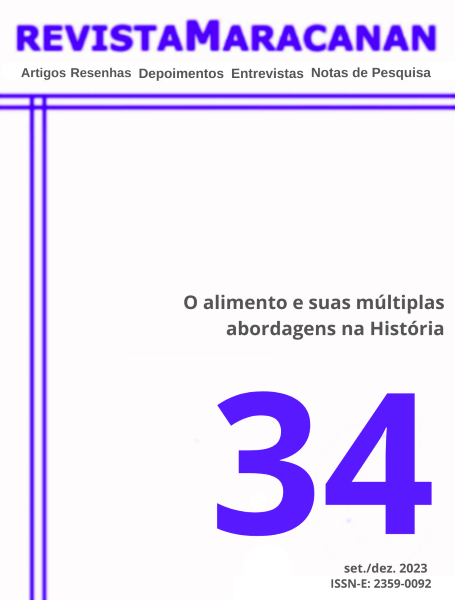Taste and faith: sacred food in Batuque and anti-racist education
DOI:
https://doi.org/10.12957/revmar.2023.78259Keywords:
Food, Sacret, Batuque, Anti-racist educationAbstract
This study deals with religious food in Batuque. It is believed that Brazilian society still lacks understanding about the different forms of appropriation of food beyond the act of nourishing oneself. Through the analysis of the sacred condition of the cuisine developed in the terreiras of the Serra Gaúcha region, the study identifies the particularities of the gastronomy developed in these spaces of faith and its importance in the anti-racist struggle. The methodology of oral history is used for the knowledge of the ways of preparing the dishes offered to the Orixás and their meanings for their practitioners. The result of the study is a recipe booklet, entitled O Sabor do Saber (The Taste of Knowledge), which presents some ways of making these delicacies and their mythical meanings. The construction of this material took place through shared authority with the religious masters who hold the knowledge about this cuisine, both in access to the instructions for execution and in the supervision of the ways of preparation.
Downloads
References
Textos Didáticos
TROGLIO, Matheus et al. O sabor do saber: a alimentação ancestral do Batuque do Rio Grande do Sul. [S. n. t.], 2022. (Material Didático). Texto e fotos de Matheus Troglio. Projeto gráfico de Gabriel Radaelli. Desenhos em Aquarela de Janaína Souza dos Santos. Orientação de Dr.ª Cristine Fortes Lia. Autoridades de Matriz Africana consultadas: Baba Phil de Xangô, Agandju Ibeji, Michele de Iemanjá, Jeferson da Iansã e Mãe Adri de Oxum. Disponível em: https://repositorio.ucs.br/xmlui/handle/11338/11358. Acesso em 1º ago. 2023.
Bibliografia
ALBERTI, Verena. Manual de história oral. Rio de Janeiro: FGV Ed., 2004.
ALBUQUERQUE JÚNIOR, Durval Muniz de. História: a arte de inventar o passado (ensaios de teoria da História). Curitiba: Appis, 2019.
ALBUQUERQUE JÚNIOR, Durval Muniz de. O tecelão dos tempos. São Paulo: Intermeios, 2019.
AZAMBUJA, Luciano de. Qual a Sua Lembrança Gastronômica? RIBEH, v. 1, n. 01, p. 200-226, ago.-dez. 2018.
BARCELLOS, Gustavo. O banquete de Psique: imaginação, cultura e psicologia da alimentação. Petrópolis, RJ: Vozes, 2017.
CARNEIRO, Henrique. Comida e sociedade: uma história da alimentação. Rio de Janeiro: Elsevier, 2003.
CASCUDO, Luís da Câmara. Antologia da alimentação no Brasil. São Paulo: Global, 2008.
CORRÊA, Norton Figueiredo. “A cozinha é a base da religião”: a culinária ritual no batuque do Rio Grande do Sul. Arquivos Brasileiros da Alimentação, São Luiz, v. 2, n. 1, p. 116-127, jan. 2017.
CORRÊA, Norton Figueiredo. O Batuque do Rio Grande do Sul: antropologia de uma religião afro-rio-grandense. São Luiz: Cultura e Arte, 2016.
DURKHEIM, Émile. As formas elementares da vida religiosa. São Paulo: Marins Fontes, 2001.
FRISCH, Michael. A Shared Authority: Essays on the Craft and Meaning of Oral and Public History. Albany, NY: State Univ. of the New York Press, 1990.
LODY, Raul. Dendê, símbolo e sabor da Bahia. São Paulo: SENAC, 2009.
LODY, Raul. Santo também come. Rio de Janeiro: Pallas, 2012.
MALINOWSKI, Bronislaw. Argonautas do Pacífico Ocidental. São Paulo: Abril Cultural, 2018.
MEIHY, José Carlos Sebe B.; HOLANDA, Fabíola. História oral: como fazer, como pensar. São Paulo: Contexto, 2007. MONTANARI, Massimo. A comida como cultura. São Paulo: SENAC, 2013.
MUNANGA, Kabengele. Nosso Racismo é um crime perfeito. (Entrevista). Fundação Perseu Abramo (Site). Publicado em: 8 set. 2010. Disponível em: https://fpabramo.org.br/2010/09/08/nosso-racismo-e-um-crime-perfeito-entrevista-com-kabengele-munanga/. Acesso em: 26 nov. 2020.
OLIVEIRA, Luiz Fernandes de; CANDAU, Vera Maria Ferrão. Pedagogia decolonial e educação antirracista e intercultural no Brasil. Educ. rev., Belo Horizonte, v. 26, n. 1, p. 15-40, abr. 2010. DOI: https://doi.org/10.1590/S0102-46982010000100002.
PARÉS, Luis Nicolau. A formação do candomblé: história e ritual da nação Jeje na Bahia. Campinas, SP: Unicamp, 2018.
PILÃO, Valéria, FALEIROS, Juliana Leme. Racismo religioso na sociedade brasileira: reflexos de uma democracia restrita. Revista Brasileira de História das Religiões, ANPUH, ano XV, n. 43, p. 76-96, maio-ago. 2022.
PÓVOAS, Ruy do Carmo. Itan dos mais-velhos: contos. Ilhéus, BA: Editus, 2004.
RIBEIRO, Prisciane Pinto Fabrício. Uma análise do tríplice conceito de mito. Letras e Ideias, João Pessoa, v. 2, n. 2, p. 133-145, jul.-dez. 2018.
SANTOS, Miriam de Oliveira; ZANINI, Maria Catarina Chitolina. Especificidades da identidade de descendentes de italianos no sul do Brasil: breve análise das regiões de Caxias do Sul e Santa Maria. Antropolítica, UFF, Niterói (RJ), v. 27, p. 21-42, 2009.
SILVA, Paulo Roberto S. da. Batuque: seus encantos e rituais. Porto Alegre: Legião Publicações, 2017.
SILVEIRA, Hendrix. Não somos filhos sem pai: história e teologia do Batuque do Rio Grande do Sul. São Paulo: Arole Cultural, 2020.
TROGLIO, Matheus. A alimentação sagrada do batuque do Rio Grande do Sul: a relação biomítica da culinária ancestral. 2022. Dissertação (Mestrado Profissional em História) – Universidade de Caxias do Sul, Caxias do Sul, 2022.
VALLADARES, Licia. Os dez mandamentos da observação participante. Revista Brasileira de Ciências Sociais, São Paulo, v. 22, n. 63, p. 153-155, 2005.
WEISS, Raquel Andrade. Efervescência, dinamogenia e ontogênese social do sagrado. Mana, Rio de Janeiro, v. 19, n. 1, p. 157-179, abr. 2013.
WILLIAM, Rodney. Apropriação cultural. São Paulo: Jandaíra, 2019.
Downloads
Published
How to Cite
Issue
Section
License
Copyright (c) 2023 Revista Maracanan

This work is licensed under a Creative Commons Attribution-NonCommercial-ShareAlike 4.0 International License.
The copyrights of originals and translations published are automatically assigned to Revista Maracanan. The information contained in this papers are the sole responsibility of the authors.
The Copyright of the published articles belong to Revista Maracanan, with works simultaneously licensed under a Creative Commons Attribution-NonCommercial-ShareAlike 4.0 International License, which allows the sharing of work with mandatory recognition of authorship and initial publication in this journal, under the same license and for non-commercial purposes.

The Revista Maracanan is licensed with a Creative Commons Attribution-NonCommercial-ShareAlike 4.0 Internacional License.





